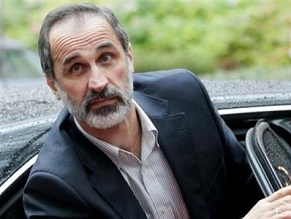|
World Jewish News

A meeting of the EU foreign affairs Council in Brussels, which groups Ministers from all 27 EU member states and saw an exchange of views with the Syrian oppostion coalition’s president Moaz Al-Khatib (picture).
|
EU FMs pledge allegiance to Syrian opposition coalition as Germany expels Syrian diplomats to reduce ‘dealings with the Assad re
12.12.2012, Israel and the World Germany announced it was expelling four Syrian embassy staff from Berlin, in an effort to isolate the authoritarian Syrian regime Monday, as Europe’s Foreign Ministers gave their backing to the new Syrian opposition coalition as “legitimate representatives of the Syrian people”.
A meeting of the EU foreign affairs Council in Brussels, which groups Ministers from all 27 EU member states and saw an exchange of views with the coalition’s president Moaz Al-Khatib, called on the National Coalition for Syrian Revolutionary and Opposition Forces “to put forward its programme for a political transition with a view to creating a credible alternative to the current regime”.
In an increasingly desperate attempt to stop the threat of civil war from further engulfing the beleaguered country, the council further warned “the current situation is unsustainable”, cautioning against the use and distribution of chemical weapons, adding that “in case of their use, those responsible will be held accountable”.
The Council’s conclusions were issued in the immediate build-up to Wednesday’s Friends of the Syrian People meeting in Marrakesh, Morocco, an attempt by the international community to unite and mobile the Syrian opposition to work with them to present themselves as a credible alternative to Bashar al Assad’s increasingly isolated regime, and a chance for the EU to “reaffirm its support to the Syrian people’s aspirations for democracy”.
By contrast, the US continued to delay issuing its official backing to the coalition, with State Department Spokesman Victoria Nuland telling reporters Monday that American participation in the Marrakesh meeting had the intended of objective of “trying to strengthen the opposition in coming up with its own plan, in working on its own connectivity between external opposition, internal opposition, effectiveness of their political operation, even as more areas are liberated from the regime”.
Insisting that any such plan emanating from the opposition must form part of a multi-faceted approach with UN-Syria envoy Lakhdar Brahimi, she said that a decision of broadening US support for the Syrian opposition would depend on the state department’s one-on-one as well as the broader group meetings with the coalition to talk “about how they see things going forward, both in terms of their own internal organization, about their connectivity with Syrians inside Syria, about their transitional planning, about the needs that they see for external support”, confirming only that the US would “like to offer them more support”.
Deflecting further questioning on the legal implications of officially recognising the group as legitimate representatives of the Syrian people in line with EU policy, she said any such decision would be the product of “progressive steps” and that it related to “decisions that we haven’t made yet and haven’t announced yet”.
Meanwhile in a statement Monday, German Foreign Minister Guido Westerwelle confirmed he had sanctioned the expulsion of four Syrian diplomats from the Syrian embassy in Berlin, as a “clear demonstration that we are reducing our dealings with the Assad regime to the absolute minimum”.
Calling on the coalition to assume its responsibilities, he said its goal was now “to consolidate its position and establish functioning transitional institutions as soon as possible”.
France, Germany, Great Britain and Italy all responded to the UN’s confirmation of the regime’s culpability of the Houla massacre in May, which saw more than 100 murdered primarily by close-range shot, by expelling Syrian ambassadors to their country in a move coordinated with US policy to attempt to isolate the Syrian president from the international community.
Expressing their common concerns about the worsening human rights situation in Syria, to coincide with International Human Rights Day which also saw the EU officially receive the Nobel Peace Prize in Oslo, the European foreign leaders said they were “deeply concerned about the widespread and systematic violations of human rights and international humanitarian law which...may amount to crimes against humanity and war crimes”.
“All those responsible for such crimes must be held accountable and that there should be no impunity for such violations and abuses,” continued the resolution, as it further threatened the possibility of outside intervention from the International Criminal Court, should “concerns about war crimes and crimes against humanity (not be) adequately addressed on a national level”.
In echoes of previous statements on the prolonged humanitarian crisis in Syria, the council concluded that it would be ready to engage with the people and new administration “once transition takes place”, as it insisted “the EU stands ready to develop a new and ambitious partnership with Syria across all areas of mutual interest”.
EJP
|
|
